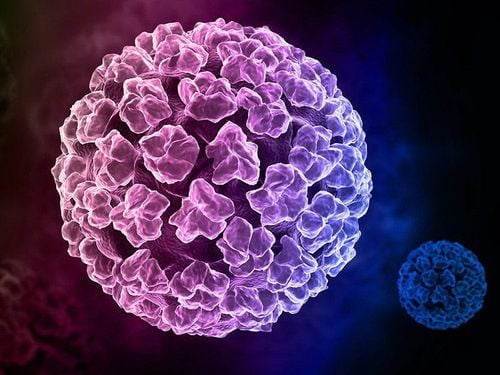This is an automatically translated article.
The article was professionally consulted by a doctor from the Department of Obstetrics and Gynecology, Vinmec Hai Phong International General Hospital.Syphilis is one of the most feared sexually transmitted diseases, seriously threatening the health and life of the patient. Without prompt medical care, the patient can experience many dangerous complications. So what causes syphilis? How is syphilis transmitted and signs of syphilis?
1. What is syphilis?
Syphilis is a bacterial infection caused by the bacterium Treponema pallidum. Syphilis bacteria enter the body directly during unprotected sex (vaginal, anal or oral), through scratches on the skin and mucous membranes when in contact with secretions from syphilis lesions.
Syphilis spirochetes can also be transmitted from mother to baby during the fetal period from the 4th month onwards, because this spirochete enters the fetal blood through the umbilical cord.
Due to the open structure of the genitals, women are more susceptible to sexually transmitted diseases than men, including syphilis. Syphilis in women, if not treated in time, can cause damage to all parts of the body such as genital ulcers, skin rashes, musculoskeletal pain, even causing syphilis. affect internal organs.
Trắc nghiệm: Bạn có phân biệt được chính xác cảm lạnh và cúm mùa?
Cảm cúm và cảm lạnh là hai khái niệm mà chúng ta thường đánh đồng nó giống nhau, không phân biệt rõ ràng. Dưới đây là một số câu hỏi trắc nghiệm, giúp bạn có thêm những kiến thức phân biệt cảm lạnh và cảm cúm. Từ đó, có những biện pháp điều trị bệnh phù hợp.2. Causes of syphilis
The causative agent is the spirochete syphilis (Treponema pallidum) discovered by Schaudinn and Hauffman in 1905. This spirochete is spring-shaped, consisting of 6-14 helices. The resistance of this spirochete is very weak, out of the body it can live no more than a few hours. In ice, it retains its mobility for a long time, at 45 degrees Celsius it will die after 30 minutes. Disinfectants and soaps can kill this spirochete in a few minutes.
3. Signs and symptoms
Signs and symptoms of syphilis occur in 3 periods:
Stage 1: This is the incubation period that usually lasts about 3 weeks. Then, after the incubation period, the disease will begin to show symptoms of chancres and lymph nodes. Syphilis chancre is a shallow erosion, round or oval, without high ridges, about 0.5 - 2cm in size, clearly and regularly demarcated, clean red bottom like fresh meat, hard background (hence the reason) called schizophrenia) and squeeze painlessly. Syphilis is most commonly found in the genital mucosa. In women, it will often be found on the labia majora, labia minora, and vulva margins. In men, it is common in the glans, mouth flute, scrotum, penis... In addition, syphilis chancre can be found in the mouth, lips, tongue... Nodes will appear 5 - 6 days after the chancre. The inguinal lymph nodes are enlarged and clustered, in which there is one largest lymph node called the king. Stage 2: This is the 45-day period after the onset of syphilis and can last up to 2-3 years. Skin and mucosal lesions appear, but when they heal, they usually do not leave scars. Syphilis spirochetes easily cause sepsis with symptoms of fever and lymphadenopathy. This period often has clinical manifestations such as: red-pink maculopapular lesions scattered on the trunk, syphilitic papules with various forms (red-pink papules, infiltrative and possibly scaly rim around, syphilis papules psoriasis, acne, necrotic papules...), hypertrophic papules are common in the anus and genitals, diffuse lymphadenitis, and thinning hair loss. Stage 3: Appears usually from 5, 10, 15 years after chancre with symptoms such as deep wound, gum in skin, bone, internal organs, cardiovascular and nerve. At this stage, the patient is less likely to infect sexual partners because the spirochetes have penetrated and resided in the viscera, no longer in the skin and mucous membranes. Note: Between period 1 to stage 2, between period 2 to stage 3, the disease may not have clinical symptoms. It is closed syphilis and is detected only by serological detection.

Giang mai có thể biểu hiện ở vùng miệng
4. Complications of syphilis
Syphilis can cause a number of dangerous complications such as:
Syphilis spirochetes can damage all vital organs in the body. Syphilis affects the skin, mucous membranes, eyes, internal organs such as liver, heart, nerves. The disease can cause dangerous complications such as aortic inflammation, aortic aneurysm, systemic paralysis, mental disorders, hepatitis. Congenital syphilis can cause fetal death or birth defects.
5. Syphilis is transmitted by which way?
Syphilis spirochetes are often found in many lesions (tumors, mucosal plaques, lymph nodes...). So the disease is very contagious if you have unprotected sex with an infected person. The most contagious disease is stage 1 and 2 when the skin and mucosal lesions contain many syphilis spirochetes.
The disease is mainly transmitted through unprotected sex. The spirochetes penetrate through the skin - the mucous membranes of the genitals are more or less rubbed during sexual intercourse, causing local disease (chicken), entering the bloodstream and spreading throughout the body. Factors that increase the risk of transmission are HIV/AIDS infection, genital diseases or lesions, and unprotected sex (oral-genital sex, sexual intercourse. homosexuality...).
Syphilis can be transmitted by blood transfusion (injecting blood or injecting drugs without disinfecting syringes) and indirectly through contaminated utensils and items.
6. Syphilis prevention
Building a healthy lifestyle, being faithful to one wife and one husband. Practice safe, protected sex (using condoms). To prevent congenital syphilis, it is necessary to timely detect and treat the mother if infected during pregnancy. Systematic serological tests should be performed in all pregnant women. When detecting an illness, it is necessary to go to medical facilities for examination and treatment immediately, not to buy medicine for treatment. If you experience or do not have the above symptoms, you should still be screened for social diseases for early detection to have effective treatment and avoid complications. Vinmec International General Hospital currently has a Social Disease Screening Package, which helps to most accurately detect social diseases, including syphilis. The examination package is carried out with the participation of a team of highly qualified and experienced medical doctors, optimal facilities system and commitment to ensuring privacy for customers when visiting.
Please dial HOTLINE for more information or register for an appointment HERE. Download MyVinmec app to make appointments faster and to manage your bookings easily.
Reference source: Department of Preventive Medicine, Ministry of Health












